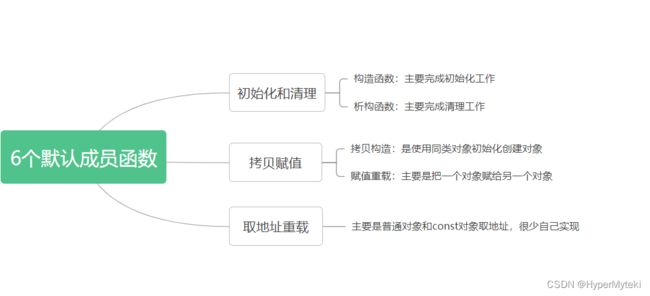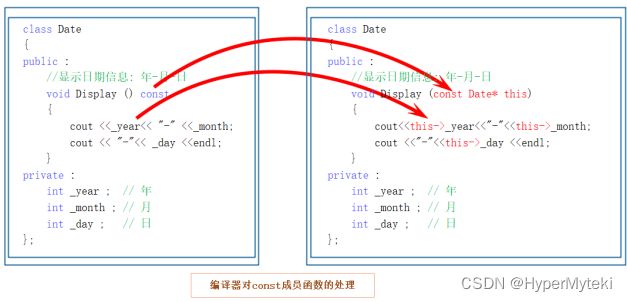M的编程备忘录之C++——类和对象(中)
目录
1、类的6个默认成员函数
2、构造函数
2.1、概念
2.2、特性
3、析构函数
3.1、概念
3.2、特性
4、拷贝构造
4.1、概念
4.2、特征
5、赋值运算符重载
5.1、运算符重载
5.2、赋值运算符重载
5.3、前置++和后置++重载
6、日期类实现
//Date.h
//Date.cpp
7、const成员
8、取地址及const取地址操作符重载
1、类的6个默认成员函数
任何类在什么都不写时,编译器会自动生成以下6个默认成员函数。
2、构造函数
2.1、概念
构造函数是一个特殊的成员函数,名字与类名相同,创建类类型对象时由编译器自动调用,以保证每个数据成员都有 一个合适的初始值,并且在对象整个生命周期内只调用一次。
2.2、特性
构造函数是特殊的成员函数,需要注意的是,构造函数虽然名称叫构造,但是构造函数的主要任务并不是开空间创建对象,而是初始化对象。
其特征如下:
1、函数名与类名相同。
2、无返回值。
3、对象实例化时编译器自动调用对应的构造函数。
4、构造函数可以重载。
class Date
{
public:
Date()// 1.无参构造函数
{}
Date(int year, int month, int day)// 2.带参构造函数
{
_year = year;
_month = month;
_day = day;
}
private:
int _year;
int _month;
int _day;
}; 5、如果类中没有显式定义构造函数,则C++编译器会自动生成一个无参的默认构造函数,一旦用户显式定义编译器将不再生成
6、编译器自动生成的默认构造函数,不会处理内置类型(语言提供的数据类型),对于自定义类型会自动调用它的默认构造函数,C++11 中针对内置类型成员不初始化的缺陷,又打了补丁,即:内置类型成员变量在类中声明时可以给默认值
7、无参的构造函数和全缺省的构造函数都称为默认构造函数,并且默认构造函数只能有一个。注意:无参构造函数、全缺省构造函数、没写编译器默认生成的构造函数,都可以认为是默认构造函数。
3、析构函数
3.1、概念
析构函数:与构造函数功能相反,析构函数不是完成对对象本身的销毁,局部对象销毁工作是由编译器完成的。而对象在销毁时会自动调用析构函数,完成对象中资源的清理工作。
3.2、特性
1、析构函数名是在类名前加上字符 ~。
2、无参数无返回值类型。
3、一个类只能有一个析构函数。若未显式定义,系统会自动生成默认的析构函数。注意:析构函数不能重载
4、对象生命周期结束时,C++编译系统系统自动调用析构函数。
~Date()
{}4、拷贝构造
4.1、概念
4.2、特征
1、拷贝构造函数是构造函数的一个重载形式。
2、拷贝构造函数的参数只有一个且必须是类类型对象的引用,使用传值方式编译器直接报错,因为会引发无穷递归调用。
3、若未显式定义,编译器会生成默认的拷贝构造函数。 默认的拷贝构造函数对象按内存存储按字节序完成拷贝,这种拷贝叫做浅拷贝,或者值拷贝。在编译器生成的默认拷贝构造函数中,内置类型是按照字节方式直接拷贝的,而自定义类型是调用其拷贝构造函数完成拷贝的。
4、类中如果没有涉及资源申请时,拷贝构造函数是否写都可以;一旦涉及到资源申请时,则拷贝构造函数是一定要写的,否则就是浅拷贝
5、拷贝构造函数典型调用场景
使用已存在对象创建新对象
函数参数类型为类类型对象
函数返回值类型为类类型对象
5、赋值运算符重载
5.1、运算符重载
C++为了增强代码的可读性引入了运算符重载,运算符重载是具有特殊函数名的函数,也具有其返回值类型,函数名字以及参数列表,其返回值类型与参数列表与普通的函数类似。
5.2、赋值运算符重载
Date& operator=(const Date& d)
{
if(this != &d)
{
_year = d._year;
_month = d._month;
_day = d._day;
}
return *this;
} 2、赋值运算符只能重载成类的成员函数不能重载成全局函数
赋值运算符如果不显式实现,编译器会生成一个默认的。此时用户再在类外自己实现一个全局的赋值运算符重载,就和编译器在类中生成的默认赋值运算符重载冲突了,故赋值运算符重载只能是类的成员函数。
3、用户没有显式实现时,编译器会生成一个默认赋值运算符重载,以值的方式逐字节拷贝。注意:内置类型成员变量是直接赋值的,而自定义类型成员变量需要调用对应类的赋值运算符重载完成赋值。如果类中未涉及到资源管理,赋值运算符是否实现都可以;一旦涉及到资源管理则必须要实现
5.3、前置++和后置++重载
// 前置++:返回+1之后的结果
Date& operator++()// 注意:this指向的对象函数结束后不会销毁,故以引用方式返回提高效率
{
_day += 1;
return *this;
}
// 后置++:
Date operator++(int)// 而temp是临时对象,因此只能以值的方式返回,不能返回引用
{
Date temp(*this);
_day += 1;
return temp;
}
// 注意:后置++是先使用后+1,因此需要返回+1之前的旧值,故需在实现时需要先将this保存一份,
然后给this+1
// 前置++和后置++都是一元运算符,为了让前置++与后置++形成能正确重载
// C++规定:后置++重载时多增加一个int类型的参数,但调用函数时该参数不用传递,编译器自动传
递
6、日期类实现
//Date.h
#pragma once
#include
using std::cout;
using std::endl;
using std::cin;
class Date
{
friend std::ostream& operator<<(std::ostream& out, const Date& d);
friend std::istream& operator>>(std::istream& in, Date& d);
public:
bool JudgeYear(int year);
int GetMonthDay(int year, int month);// 获取某年某月的天数
Date(int year = 1900, int month = 1, int day = 1);// 全缺省的构造函数
Date(const Date& d);// 拷贝构造函数
~Date();// 析构函数
Date& operator=(const Date& d);// 赋值运算符重载
Date& operator+=(int day);// 日期+=天数
Date operator+(int day);// 日期+天数
Date operator-(int day);// 日期-天数
Date& operator-=(int day);// 日期-=天数
Date& operator++();// 前置++
Date operator++(int);// 后置++
Date operator--(int);// 后置--
Date& operator--();// 前置--
bool operator>(const Date& d);// >运算符重载
bool operator==(const Date& d);// ==运算符重载
bool operator >= (const Date& d);// >=运算符重载
bool operator < (const Date& d);// <运算符重载
bool operator <= (const Date& d);// <=运算符重载
bool operator != (const Date& d);// !=运算符重载
int operator-(const Date& d);// 日期-日期 返回天数
void Print();
private:
int _year;
int _month;
int _day;
}; //Date.cpp
#include "Date.h"
#define _CRT_SECURE_NO_WARNINGS 1
bool Date::JudgeYear(int year)
{
if ((year % 4 == 0 && year % 100 != 0) || year % 400 == 0)
{
return true;
}
else
{
return false;
}
}
int Date::GetMonthDay(int year, int month)
{
static int MonthDay[13] = { 0,31,28,31,30,31,30,31,31,30,31,30,31 };
if (month == 2 && JudgeYear(year))
{
return 29;
}
return MonthDay[month];
}
Date::Date(int year, int month, int day)
{
if (year >= 1 && month >= 1 && month <= 12 && day >= 1 && day <= GetMonthDay(year, month))
{
_year = year;
_month = month;
_day = day;
}
else
{
cout << "日期输入错误" << endl;
}
}
Date::Date(const Date& d)
{
this->_year = d._year;
this->_month = d._month;
this->_day = d._day;
}
Date::~Date()
{
}
Date& Date::operator=(const Date& d)
{
this->_year = d._year;
this->_month = d._month;
this->_day = d._day;
return *this;
}
Date& Date::operator+=(int day)
{
_day += day;
while (_day > GetMonthDay(_year, _month))
{
_day -= GetMonthDay(_year, _month);
_month++;
if (_month == 13)
{
_year++;
_month = 1;
}
}
return *this;
}
Date Date::operator+(int day)
{
Date ret(*this);
ret += day;
return ret;
}
Date Date::operator-(int day)
{
Date ret(*this);
ret -= day;
return ret;
}
Date& Date::operator-=(int day)
{
_day -= day;
while (_day <= 0)
{
_day += GetMonthDay(_year, _month);
_month--;
if (_month == 0)
{
_month = 12;
_year--;
}
}
return *this;
}
Date& Date::operator++()
{
*this += 1;
return *this;
}
Date Date::operator++(int)
{
Date tmp(*this);
*this += 1;
return tmp;
}
Date Date::operator--(int)
{
Date tmp(*this);
*this += 1;
return tmp;
}
Date& Date::operator--()
{
*this += 1;
return *this;
}
bool Date::operator>(const Date& d)
{
if (_year > d._year
|| (_year == d._year && _month > d._month)
|| (_year == d._year && _month == d._month && _day > d._day))
{
return true;
}
else
{
return false;
}
}
bool Date::operator==(const Date& d)
{
if (_year == d._year && _month == d._month && _day == d._day)
{
return true;
}
else
{
return false;
}
}
bool Date::operator>=(const Date& d)
{
return *this > d || *this == d;
}
bool Date::operator<(const Date& d)
{
return !(*this >= d);
}
bool Date::operator<=(const Date& d)
{
return *this < d || *this == d;
}
bool Date::operator!=(const Date& d)
{
return !(*this == d);
}
int Date::operator-(const Date& d)
{
int flag = 1;
Date max = *this;
Date min = d;
if (max < min)
{
max = d;
min = *this;
flag = -1;
}
int n = 0;
while (max != min)
{
n++;
min++;
}
return flag * n;
}
void Date::Print()
{
cout << _year << "/" << _month << "/" << _day << endl;
}
std::ostream& operator<<(std::ostream& out, const Date& d)
{
out << d._year << "/" << d._month << "/" << d._day << endl;
return out;
}
std::istream& operator>>(std::istream& in, Date& d)
{
in >> d._year >> d._month >> d._day;
return in;
}7、const成员
将const修饰的“成员函数”称之为const成员函数,const修饰类成员函数,实际修饰该成员函数隐含的this指针,表明在该成员函数中不能对类的任何成员进行修改。
8、取地址及const取地址操作符重载
class Date
{
public :
Date* operator&()
{
return this ;
}
const Date* operator&()const
{
return this ;
}
private :
int _year ; // 年
int _month ; // 月
int _day ; // 日
};
